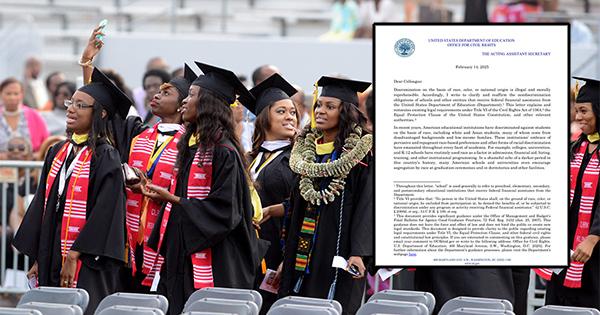
Nationwide — The U.S. Department of Education has issued a new directive that will eliminate race-based considerations in admissions, hiring, and financial aid, a move that will effectively outlaw scholarships specifically designed to support Black students. According to Diverse, this sweeping order, which applies to all schools receiving federal funding, mandates that institutions remove race-conscious policies within just 14 days or risk losing government support. While officials claim the decision upholds civil rights laws and constitutional principles, critics argue it will dismantle decades of progress in addressing racial disparities in education.The new policy expands on the Supreme Court’s ruling in Students for Fair Admissions v. Harvard, which struck down affirmative action in college admissions. However, this directive goes much further, banning race-based scholarships and financial aid programs that have historically helped Black students afford higher education. Scholarship programs such as the Thurgood Marshall College Fund, the United Negro College Fund (UNCF), and the Ron Brown Scholar Program, which provide crucial financial assistance to African American students, could soon be deemed illegal under the new rules. Additionally, Diversity, Equity, and Inclusion (DEI) initiatives aimed at increasing representation in higher education are also under attack.
Inside Higher Ed reports that education experts and civil rights groups are raising alarms about the directive’s rapid implementation timeline, warning that schools will struggle to overhaul their policies so quickly. The 14-day compliance window forces institutions to immediately rethink how they award financial aid, potentially cutting off crucial resources for students of color. Many argue that this move ignores the historical and systemic barriers Black students face in accessing higher education, which these scholarships were specifically created to address. Without them, they fear a significant drop in Black student enrollment and retention rates.
Critics also argue that the Department’s order oversteps the Supreme Court’s decision, which focused on admissions policies rather than financial aid or scholarships. Legal experts point out that the ruling did not explicitly call for the elimination of race-based scholarships, yet the Department has chosen to interpret it in a way that will have far-reaching consequences. By removing race-conscious financial aid, they warn, the federal government is widening the racial wealth gap and making it even harder for Black students to compete in an already unequal system.
The directive, which was released in a “Dear Colleague Letter” from the Department of Education, also targets DEI programs, claiming they suppress free speech and enforce ideological conformity. However, advocates argue that such programs provide essential support systems for Black students, including mentorship, career development, and networking opportunities. By eliminating them, along with race-based scholarships, critics say the federal government is not only stripping away financial aid but also removing the very resources that help Black students thrive in predominantly white institutions. The long-term impact of this decision, they warn, could lead to fewer Black professionals in critical fields such as law, medicine, and technology.
As colleges and universities rush to interpret and implement these changes, the future of race-based scholarships remains uncertain. Schools must now find alternative ways to support underrepresented students without violating the new directive, but many fear that the elimination of these programs will disproportionately harm Black students. While the Department of Education has set up a complaint system to monitor compliance, civil rights groups are already preparing legal challenges, arguing that the policy is not only unfair but also an intentional effort to roll back progress on racial equity in education.
